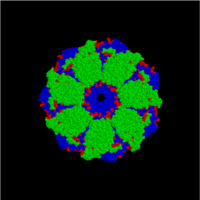
Melanin nanoparticles enhance the neuroprotection of mesenchymal stem cells against hypoxic-ischemic injury by inhibiting apoptosis and upregulating antioxidant defense.
Sign Up to like & getrecommendations! Published in 2022 at "Cell biology international"
DOI: 10.1002/cbin.11781
Abstract: Polydopamine nanoparticles are artificial melanin nanoparticles (MNPs) that show strong antioxidant activity. The effects of MNPs on the neuroprotection of mesenchymal stem cells (MSCs) against hypoxic-ischemic injury and the underlying mechanism have not yet been… read more here.
Keywords: mscs; neuroprotection; apoptosis; hypoxic ischemic ... See more keywords

TREM2‐dependent microglial function is essential for remyelination and subsequent neuroprotection
Sign Up to like & getrecommendations! Published in 2023 at "Glia"
DOI: 10.1002/glia.24335
Abstract: Disability in multiple sclerosis (MS) is driven in part by the failure of remyelination and progressive neurodegeneration. Microglia, and specifically triggering receptor expressed on myeloid cells 2 (TREM2), a factor highly expressed in microglia, have… read more here.
Keywords: neuroprotection; trem2 knockout; remyelination; trem2 dependent ... See more keywords

Garcinol blocks motor behavioural deficits by providing dopaminergic neuroprotection in MPTP mouse model of Parkinson's disease: involvement of anti-inflammatory response.
Sign Up to like & getrecommendations! Published in 2021 at "Experimental brain research"
DOI: 10.1007/s00221-021-06237-y
Abstract: Although the etiology of Parkinson's disease (PD) is poorly understood, studies in animal models revealed loss of dopamine and the dopaminergic neurons harbouring the neurotransmitter to be the principal cause behind this neuro-motor disorder. Neuroinflammation… read more here.
Keywords: anti inflammatory; garcinol; behavioural deficits; dopaminergic neuroprotection ... See more keywords

Betaine in the Brain: Characterization of Betaine Uptake, its Influence on Other Osmolytes and its Potential Role in Neuroprotection from Osmotic Stress
Sign Up to like & getrecommendations! Published in 2017 at "Neurochemical Research"
DOI: 10.1007/s11064-017-2397-3
Abstract: Betaine (N-trimethylglycine), a common osmolyte, has received attention because of the number of clinical reports associating betaine supplementation with improved cognition, neuroprotection and exercise physiology. However, tissue analyses report little accumulation of betaine in brain… read more here.
Keywords: betaine uptake; osmotic stress; betaine; neuroprotection ... See more keywords

Mechanism of Neuroprotection Against Experimental Spinal Cord Injury by Riluzole or Methylprednisolone
Sign Up to like & getrecommendations! Published in 2017 at "Neurochemical Research"
DOI: 10.1007/s11064-017-2459-6
Abstract: Any spinal cord injury carries the potential for persistent disability affecting motor, sensory and autonomic functions. To prevent this outcome, it is highly desirable to block a chain of deleterious reactions developing in the spinal… read more here.
Keywords: mechanism; cord; neuroprotection; cord injury ... See more keywords

Ephrin–Eph Signaling as a Novel Neuroprotection Path in Ischemic Stroke
Sign Up to like & getrecommendations! Published in 2020 at "Journal of Molecular Neuroscience"
DOI: 10.1007/s12031-020-01603-x
Abstract: The search for novel neuroprotection strategies in ischemic stroke continues, as revascularization using tissue-plasminogen activator is the only pharmacological method currently available to patients. The purpose of this review article is to summarize research findings regarding… read more here.
Keywords: ephrin eph; ischemic stroke; neuroprotection;

Defining a Time Window for Neuroprotection and Glia Modulation by Caffeine After Neonatal Hypoxia-Ischaemia
Sign Up to like & getrecommendations! Published in 2020 at "Molecular Neurobiology"
DOI: 10.1007/s12035-020-01867-9
Abstract: Hypoxic-ischemic (HI) brain injury remains an important cause of brain damage in neonates with potential life-long consequences. Caffeine, which is a competitive inhibitor of adenosine receptors, is commonly used as treatment for preterm apnoea in… read more here.
Keywords: hypoxia ischaemia; brain; neuroprotection; defining time ... See more keywords

l-Serine-Mediated Neuroprotection Includes the Upregulation of the ER Stress Chaperone Protein Disulfide Isomerase (PDI)
Sign Up to like & getrecommendations! Published in 2017 at "Neurotoxicity Research"
DOI: 10.1007/s12640-017-9817-7
Abstract: The unfolded protein response (UPR) is a highly evolutionarily conserved response to endoplasmic reticulum (ER) stress, which functions to return cells to homeostasis or send them into apoptosis, depending on the degree of cellular damage.… read more here.
Keywords: protein; disulfide isomerase; serine; protein disulfide ... See more keywords

Ketogenic diet, neuroprotection, and antiepileptogenesis
Sign Up to like & getrecommendations! Published in 2020 at "Epilepsy Research"
DOI: 10.1016/j.eplepsyres.2020.106444
Abstract: High fat, low carbohydrate ketogenic diets (KD) have been in use for the treatment of epilepsy for almost a hundred years. Remarkably, seizures that are resistant to conventional anti-seizure drugs can in many cases be… read more here.
Keywords: epilepsy; diet neuroprotection; treatment; ketogenic diet ... See more keywords

Elezanumab, a clinical stage human monoclonal antibody that selectively targets repulsive guidance molecule A to promote neuroregeneration and neuroprotection in neuronal injury and demyelination models
Sign Up to like & getrecommendations! Published in 2021 at "Neurobiology of Disease"
DOI: 10.1016/j.nbd.2021.105492
Abstract: Repulsive guidance molecule A (RGMa) is a potent inhibitor of axonal growth and a regulator of neuronal cell death. It is up-regulated following neuronal injury and accumulates in chronic neurodegenerative diseases. Neutralizing RGMa has the… read more here.
Keywords: antibody; neuroregeneration; rgma; promote ... See more keywords

Neuroprotection and secondary damage following spinal cord injury: concepts and methods
Sign Up to like & getrecommendations! Published in 2017 at "Neuroscience Letters"
DOI: 10.1016/j.neulet.2016.12.004
Abstract: Neuroprotection refers to the attenuation of pathophysiological processes triggered by acute injury to minimize secondary damage. The development of neuroprotective treatments represents a major goal in the field of spinal cord injury (SCI) research. In… read more here.
Keywords: damage; secondary damage; neuroprotection; cord injury ... See more keywords